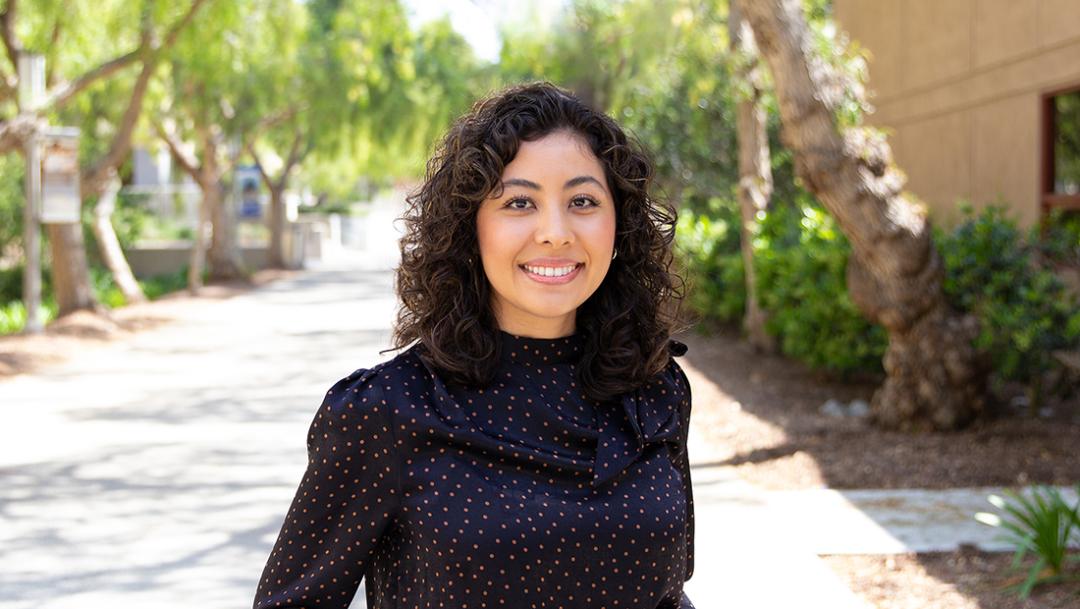
Ph.D. candidate to present and be honored at APPAM Conference
Claudia Valencia-Uribe can testify that one great application deserves another. The UC Irvine Ph.D. candidate was encouraged by her advisor, Nicola Ulibarri, associate professor of urban planning and public policy, to apply to participate in the 2023 Association for Public Policy Analysis & Management (APPAM) Annual Fall Research Conference in Atlanta this November.
“My proposal was accepted, and I will be presenting a poster during one of the conference sessions,” Valencia-Uribe reports.
But Ulibarri was not done encouraging, sharing with Valencia-Uribe the opportunity to apply for APPAM’s Equity & Inclusion Fellowship, which the association’s Policy Council and Diversity Committee created in April 2016 to encourage participation in APPAM activities by underrepresented students.
Sure enough, Valencia-Uribe was selected as a 2023 fellow who will receive a cash award to offset air and ground transportation to the Atlanta venue, as well as conference registration, meals, and hotel accommodations.
“Fellows will be treated to a celebration luncheon and meet-and-greet events where we will have the chance to network with other fellows — both current and past recipients — and professionals,” says Valencia-Uribe, who will also have her APPAM membership picked up for a year.
Asked what the honor means to her, she replies, “As a first-generation college student, this world in academia is new to me. However, past experiences have taught me the importance of surrounding myself with people who care for me and who are genuinely interested in my success. One of those figures is my advisor who has helped and supported me so much throughout the Ph.D. program. The mentorship program through APPAM presents the chance to establish another supportive relationship that can hopefully guide me through graduate school and beyond.”
Valencia-Uribe, who is about halfway through her five-year quest to receive her urban planning and public policy doctorate in June 2025, feels that being part of an equity and inclusion cohort like the APPAM fellowship folds in perfectly with her research into how certain people can experience lingering effects long after severe climate conditions like drought are declared over.
“Blanket statements and policy solutions do not always address the unique implications of these events in underrepresented and underserved communities, thus, potentially prolonging their recovery from these events,” she says. “Barriers also exist when it comes to communicating to decision makers their impacts on people’s livelihoods and the environment. Water governance processes are not always receptive to stakeholder engagement, which further limits our understanding of the problem and the strategies constructed to address it. For communities with lower socioeconomic statuses, like the ones I grew up in, it is difficult to learn how to navigate these governance spaces and to make our voices heard. This is not to mention the difficulty of finding time to engage in these processes. Governance spaces are also intimidating for certain groups who fear retaliation for speaking up.”
Receiving the fellowship “represents that there is space in the policy field for my research, which aims at increasing involvement in decision making,” Valencia-Uribe says. “It also acknowledges that there is a lot we can learn from communities like mine that for far too long have been left out of the conversation. The policy field would benefit from the diverse perspectives that my research brings to further our understanding of a recurring and worsening environmental issue.”
Speaking of acknowledging, she credits Ulibarri with playing “a significant role in my accomplishments. She always shares with me professional and funding opportunities, and always provides a letter of recommendation when needed. She also involves me in a lot of her projects so that I can further develop my research skills and gain research experience. … We meet often, and this is great because it helps me stay on top of my research as well as receive feedback.”
Valencia-Uribe finds the faculty in the Urban Planning and Public Policy Department as a whole “is pretty approachable, too,” noting that she has also worked closely with Distinguished Professor Martha Feldman, Professor and department Chair Walter Nicholls, Professor David Feldman, Associate Professor Maria Rendon, and Assistant Professor Michael Méndez. The Ph.D. candidate also appreciates the department's various workshops and the Newkirk Center for Science & Society Research Justice Shop’s workshop series, which she credits with having helped her “learn how to build relationships with the community and engage in community-based research.”
Having built strong, helpful friendships with her fellow UCI graduate students, Valencia-Uribe now looks forward to doing the same with her fellow APPAM fellows.
“I have been lucky to meet folks who have been willing to share resources with me, who have cheered me on, who have celebrated an accomplishment with me, and even leant an ear when I needed to talk about an idea or vent. A Ph.D. program is really challenging, and I have been fortunate to not be going through it alone.”
— Matt Coker